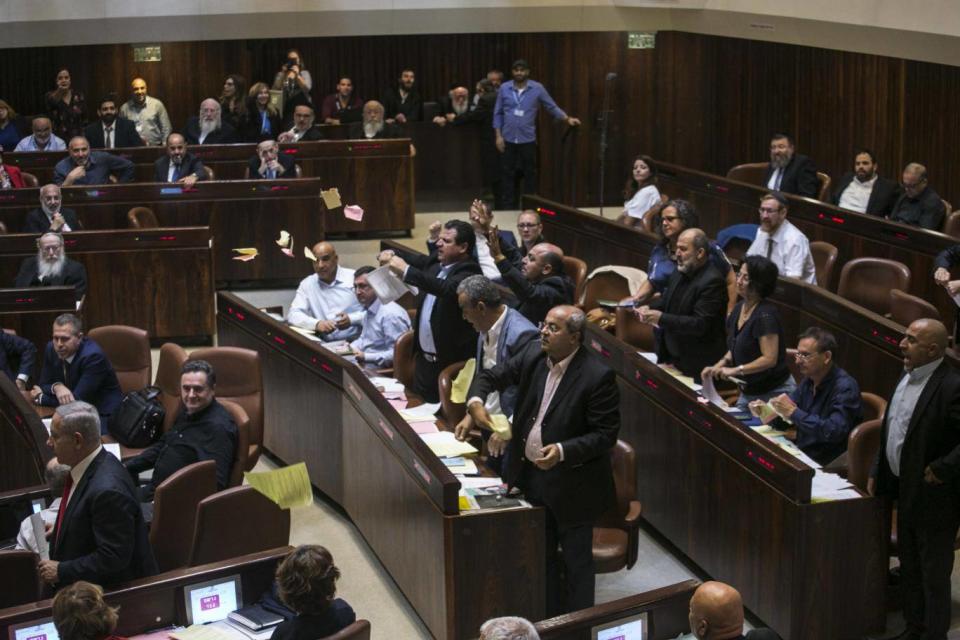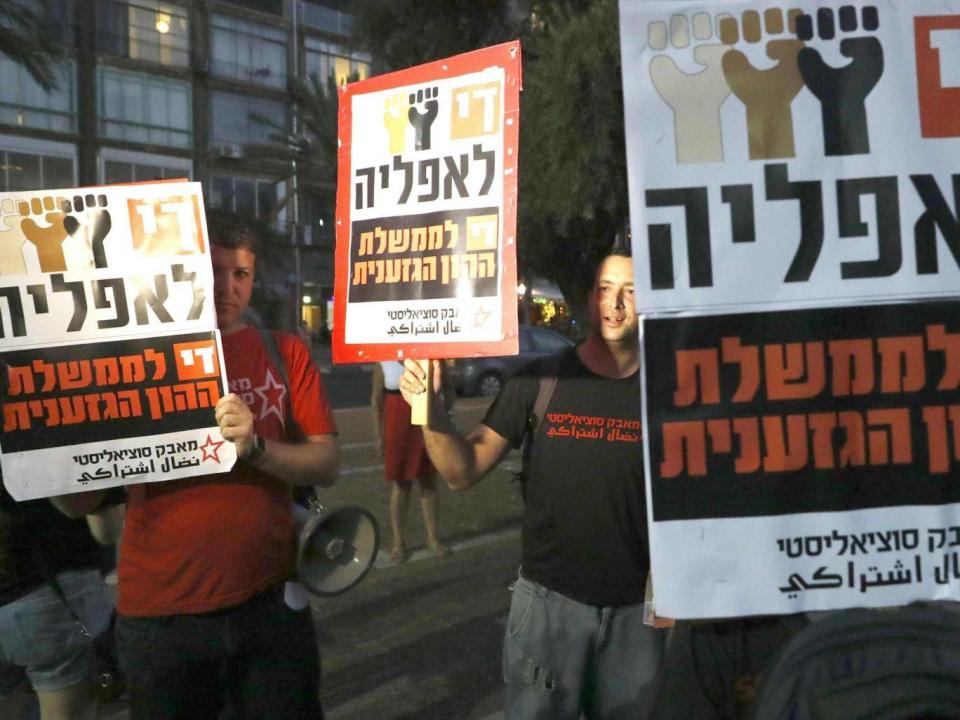Israel passes Jewish nation law branded 'racist' by critics
The Israeli parliament has adopted a contentious new law defining Israel as the national home of the Jewish people, that opposition MPs warn is racist to the country’s Arab minority and akin to “apartheid”.
The “nation state” bill, which holds a constitution-like status, was passed early on Thursday morning by 62 votes to 55 after a heated eight-hour debate during which opposition and Arab MPs tore up the printed text of the law, waved black flags and shouted “apartheid”.
Two lawmakers including Benny Begin, son of former Israeli prime minister Menachem Begin, the founder of Israel’s ruling Likud party, abstained from voting. Begin warned of the party’s growing disconnect from human rights.
The law has bitterly divided the parliament, sparked mass protests in Tel Aviv and even drawn criticism from the country’s president and attorney-general. Several of the articles have been dubbed racist against the country’s 1.8 million Arabs, including one which downgraded Arabic from an official language to one of just “special status”, leaving Hebrew as the sole national language.
The government and Benjamin Netanyahu, the prime minister, have said, however, that the bill merely enshrines into law the country’s existing characteristics.
The smiling premier celebrated the move and after the vote described the passage of the new law as “a pivotal moment in the annals of Zionism and the State of Israel”.
“We enshrined in law the basic principle of our existence. Israel is the nation state of the Jewish people, that respects the individual rights of all its citizens,” he told the Knesset, Israel’s parliament.

“This is our state – the Jewish state. In recent years there have been some who have attempted to put this in doubt, to undercut the core of our being. Today we made it law: this is our nation, language and flag.”
Amir Ohana a Likud party MP and chairman of the joint committee that promoted the bill, dismissed critics, saying minorities cannot set the agenda for the majority.
“Those who believe this law is racist are like those who think Zionism is racism,” he told the plenum.
“This moment will be remembered in the history of the Jewish nation. We are laying down one of the cornerstones of our existence … After 2,000 years of exile, we have a home.”
Haaretz, a left-leaning paper, described Avi Dichter, a sponsor of the law and the parliament’s Foreign Affairs and Defence Committee chairman, turning to Arab MPs in the final address before voting and saying: “We were here before you, and we will be here after you.”
It’s a pivotal moment in the annals of Zionism and the State of Israel
Benjamin Netanyahu, Israeli prime minister
Mr Netanyahu’s government, seen as the most right-wing in the country’s history, had pushed for its approval before the parliament’s summer session ends on Sunday.
The legislation becomes part of the country’s basic laws, which serve as a de facto constitution. It could face a challenge by the Supreme Court.
Among the law’s 11 articles, the legislation says Jews have the right to self-determination in Israel; it appoints the contested city of Jerusalem as Israel’s capital and asserts Israel’s role preserving the cultural heritage of the Jewish diaspora.

The most controversial clause downgrades Arabic from an official language to one of just “special status”. Arabs comprise 20 per cent of Israel’s population.
Another clause sparked bitter debate as in its original form it would have legalised segregated communities. The language was altered on Wednesday, but opposition figures warned that the new wording was even worse than the original as it advances Jewish-only communities.
The final draft contains the wording: “The state sees developing Jewish settlement as a national interest and will take steps to encourage, advance, and implement this interest.”
Dov Khenin, a parliamentarian on the Joint List alliance of Arab-led parties, said the old wording at least “pretended to be neutral” as it allowed all religions to create segregated communities.
“It’s [now] stating explicitly that only Jewish communities will get priority. This is a model of undisguised racism,” he was quoted as saying by Haaretz.
On Thursday morning, opposition MPs, including Arab lawmakers, interrupted the voting results with chants of “apartheid”. They later yelled “You passed an apartheid law, a racist law,” at Mr Netanyahu as they left.
Ayman Odeh, the head of the Joint List, pulled out a black flag and waved it during his speech in parliament, warning of the implications of the law.
“This is an evil law,” he said, adding that “a black flag hovers over it”.
Today, I will have to tell my children, along with all the children of Palestinian Arab towns … that the state has declared that it does not want us here
Ayman Odeh, an Israeli-Arab MP
In a later statement he wrote that: “Today, I will have to tell my children, along with all the children of Palestinian Arab towns … that the state has declared that it does not want us here.”
Ahmed Tibi, another Arab lawmaker, later called it a “hate crime”.
Jewish organisations abroad also expressed disapproval of the law.

The American Jewish Committee, a group representing the Jewish diaspora, said it was “deeply disappointed,” saying the law “put at risk the commitment of Israel’s founders to build a country that is both Jewish and democratic”.
Jerry Silverman, CEO of Jewish Federations of North America, a powerful lobby group, even flew to Israel to discuss the more contentious parts of the law of with Mr Netanyahu earlier this week.
Members of the Palestinian leadership also expressed their concerns.
Saeb Erekat, secretary-general of the Palestine Liberation Organisation, called it a “dangerous and racist law” that “officially legalises apartheid and legally defines Israel as an apartheid system”.
Reuven Rivlin, Israel’s president, a largely symbolic role, made a rare intervention in politics earlier this month to raise his concern.
The legislation “could harm the Jewish people worldwide and in Israel and could even be used as a weapon by our enemies”, he wrote in an open letter.

 Yahoo News
Yahoo News 
